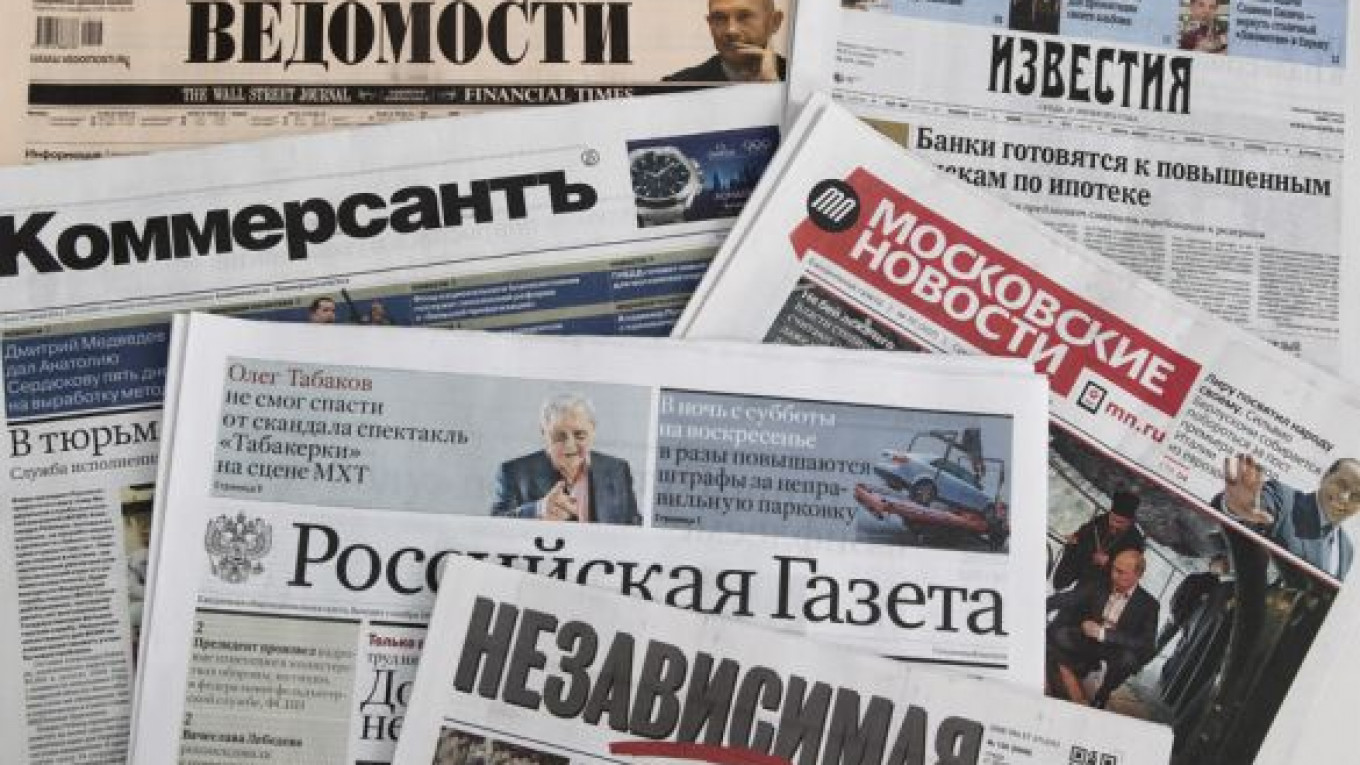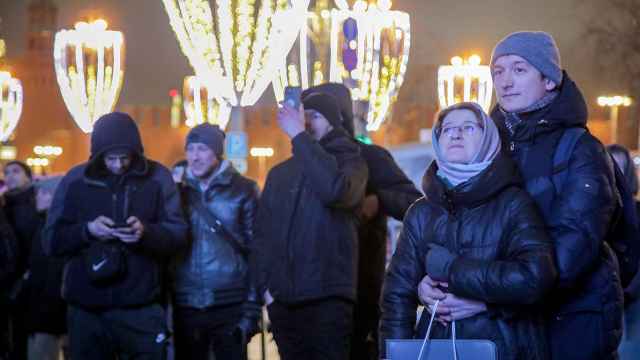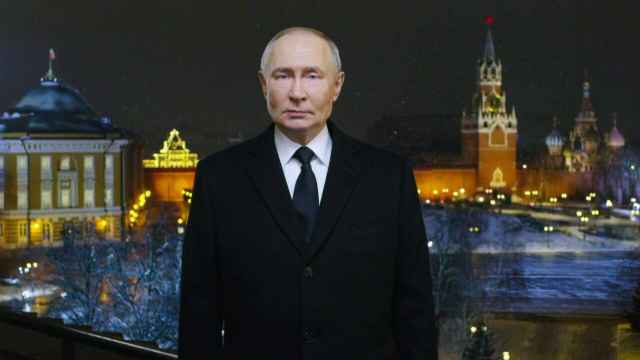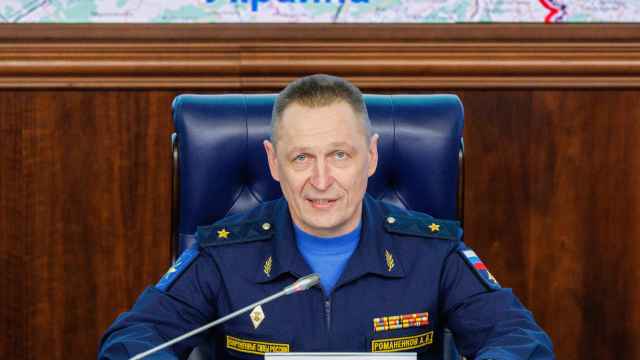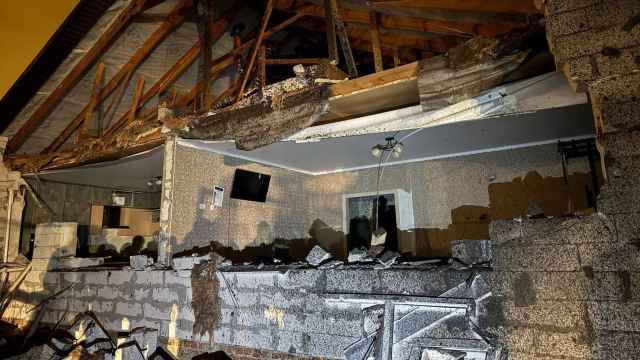Kommersant
1. Dmitry Butrin et al. article headlined "Unauthorized growth attempt" previews a meeting of the Russian cabinet and the presidential staff due to take place on May 7 that will discuss measures to boost the Russian economy; pp 1-2 (1,041 words).
2. Olga Shestopal and Valeria Kozlova article headlined "Contact without contact" says that some 15 banks have suspended cooperation with the Contact payment system after criminal proceedings were launched against a top manager of its operator Russlavbank; pp 1, 8 (763 words).
3. Nikolai Sergeyev article headlined "Interior Ministry walks on shadow side" reports the details of a major police operation to bust a gang that managed a clandestine money transfer centre that laundered funds embezzled from Russian state-owned companies. The investigation and the operation are said to have been authorized by President Putin himself; pp 1, 4 (799 words).
4. Andrei Kolesnikov article headlined "Presidential balance" gives an account of President Vladimir Putin's meeting with his Kazakh and Belarusian counterparts in Minsk, where they discussed the prospects of establishing the Eurasian Economic Union; pp 1, 6 (604 words).
5. Ivan Safronov article headlined "Parade of two victories" quotes a source in the Defense Ministry as saying that President Putin is likely to attend the May 9 parades in Moscow as well as in Sevastopol; p 2 (565 words).
6. Anna Pushkarskaya article headlined "Minority opinion spreads in Constitution Court" notes that a statement by a Constitution Court judge, Yury Danilov, criticizing the court's decision to reinstate early voting, was removed from the website of the court. Danilov described early voting as a nontransparent procedure that could cast doubt on the legitimacy of elections; p 2 (466 words).
7. Natalia Gorodetskaya article headlined "Federation Council regulates internet" reports on how the Federation Council discussed and passed two controversial bills — against "the justification Nazi crimes" and the one that requires popular bloggers to registered with the communications watchdog Roskomnadzor; p 2 (463 words).
8. Yekaterina Yeremenko article headlined "Forest fire reaches shells" says a forest fire has caused explosions at an ammunition depot in Zabaikalsky region and forced the local authorities to evacuate some 1,000 people from their homes; p 4 (432 words).
9. Sergei Mashkin article headlined "Medical case of kickback" reports new details in a criminal investigation against the head of the Burdenko military hospital and its finance officer, who are suspected of extorting a $1.4 million bribe from a businessman; p 4 (607 words).
10. Alexander Voronov article headlined "Moscow going down in price" questions Moscow's 15th place on the BackPacker Index as the city's tourism statistics may not be accurate; p 5 (641 words).
11. Ivan Tyzhlov article headlined "May 1 one step away" outlines May 1 celebrations in Moscow, with a variety of rallies and demonstrations planned to be held by pro-government movements; p 5 (403 words).
12. Sergei Strokan et al. article headlined "Personal responsibility added to Russia" comments on new sanctions against Russia that have been announced by the EU, describing them as "the softest" so far; p 6 (830 words).
13. Yury Barsukov article headlined "State-owned companies told to think about ruble" says the Russian government is encouraging Russian exporters to consider switching over to the ruble in their operations, but will hardly force them to do so; p 7 (560 words).
14. Vladislav Novy column headlined "Rules of the game" says that Russia will limit its own surveillance capabilities if proposals for excessive regulation of the internet find support with the authorities; p 7 (380 words).
15. Natalya Skorlygina and Vladimir Dzaguto article headlined "Gennady Timchenko trying to talk the Chinese in" says that one of Putin's alleged associates Gennady Timchenko, blacklisted by the U.S., has become head of the Russian-Chinese Business Council and is playing "a diplomatic role" in negotiating a series of energy projects, but is not willing to invest in them yet; p 8 (583 words).
16. Yelizaveta Kuznetsova article headlined "UACC not saved by state support" says the United Aircraft Construction Corporation had a net loss of 12.4 billon rubles ($347.7 million) in 2013, despite hefty government subsidies and growing revenue; p 9 (486 words).
17. Yegor Popov article headlined "One way to Crimea" looks at how the Russian government is going to address transportation issues in Crimea as the peninsula will be effectively blocked from the mainland as of May 10 when a bill by the Kiev government declaring it "a temporarily occupied territory" comes into force; p 9 (570 words).
Vedomosti
1. Yelena Khodyakova article headlined "Gazprom — No 1 in the world" reports that Russian gas giant Gazprom is the top global company by EBITDA and among the top five by net profit in 2013; pp 1, 12 (500 words).
2. Pavel Aptekar and Maxim Trudolyubov op-ed headlined "Brezhnev today" compares large-scale demonstrations that are planned for May 1 with those that were typical of the Soviet era; pp 1, 6 (400 words).
3. Anastasia Kornya article headlined "Black lists taken to court" says that the Association of Internet Publishers is challenging in the Constitution Court the law on restricting access to websites containing prohibited content; p 2 (300 words).
4. Svetlana Bocharova article headlined "You will answer for occupant" discusses a bill on compensating companies and individuals that have suffered from unlawful rulings of foreign courts. The bill is being drafted by a United Russia lawmaker and is said to be in retaliation for a Ukrainian bill that declares Crimea a temporarily occupied territory; p 2 (300 words).
5. Aleksei Nikolsky article headlined "Troops retreat for reinforcement" reports on how Russian troops were pulled back from the Ukrainian border following a telephone conversation between Defense Minister Sergei Shoigu and U.S. Secretary of Defense Chuck Hagel; p 3 (400 words).
6. Margarita Papchenkova and Yekaterina Kravchenko article called "Oil dispute of allies" reports that negotiations on the establishing of the Eurasian Economic Union of Russia, Kazakhstan and Belarus because the latter is haggling over oil duties; p 4 (600 words).
7. Nikolai Epple editorial called "Iranian scenario" analyzes the Iran case as a fairly successful example when the world community was able to agree on imposing economic sanctions on a country that was clearly dangerous; p 6 (400 words).
8. Vyacheslav Inozemtsev op-ed called "Deceitful word" exposes the Russian media coverage of the developments in Ukraine and Russia's stance as deceitful propaganda; pp 6-7 (1,000 words).
9. Andrei Kolesnikov op-ed headlined "Hybrid war going on" argues that neither Russia, nor the West can do anything to de-escalate tension in Ukraine because paramilitary guerrilla forces operating there and so-called "people's mayors" will not listen to them; p 7 (400 words).
10. Mikhail Serov and Yelena Khodyakova headlined "Chinese contract closer" says Russia and China have agreed to sign a contract on natural gas deliveries to China via a pipeline in May. Experts say Gazprom is extremely interested in the deal because it needs to secure itself against sanctions from the West; p 12 (300 words).
Nezavisimaya Gazeta
1. Ivan Rodin article headlined "Chaika presents Bastrykin with bill" views accusations of illegal arrests that Russian Prosecutor General Yury Chaika made against the Investigative Committee when speaking at the Federation Council as yet another round of conflict between the two agencies; pp 1-2 (949 words).
2. Yevgenya Novikova article called "Moscow and Tehran resisting sanctions" says Russia and Iran are discussing an energy deal worth around $10 billion. Washington cannot help being concerned about it as the intensifying cooperation between the two countries could effectively nullify economic sanctions imposed on them; pp 1, 10 (606 words).
3. Yury Paniyev article titled "FBI to look for Yanukovych's money" reports on an international conference of law-enforcers in London that agreed to set up a working group to help Ukraine track down funds that were allegedly embezzled by former Ukrainian officials, including deposed President Viktor Yanukovych; pp 1, 10 (551 words).
4. Svetlana Gavrilina article headlined "St. Petersburg buried under election leaflets" reviews some of the campaign newspapers and election leaflets that St. Petersburg residents have already started finding stuffed in their mailboxes and in local supermarkets, well ahead of the municipal election that is due to take place in September; pp 1, 2 (554 words).
5. Anastasia Bashkatova article titled "Russian pensioners to face relative poverty" quotes a report by the Economics Institute of the Russian Academy of Sciences that criticizes a new pension scheme saying that it will result in a drop of the average replacement ratio from 35 per cent to 19 per cent; pp 1, 4 (829 words).
6. Tatyana Ivzhenko article headlined "Kiev fears new political attempts on lives" reports on the recent developments in Ukraine where the parliament started debating a constitution reform; pp 1, 9 (1,392 words).
7. Editorial headlined "Loyalty test of sanctions" points out that Russia should probably start paying attention to smaller companies in Europe as well as businesses in Asia and Latin America as potential partners and investors as bigger ones, such as Siemens, might reconsider their plans for Russia for fear of sanctions from the U.S.; p 2 (549 words).
8. Anton Khodasevich article headlined "IMF mission gives no hope to Minsk" forecasts that economic problems might lead Belarusian President Alexander Lukashenko to call an early presidential election; p 2 (701 words).
9. Yekaterina Trifonova and Alexandra Samarina article called "Work visas offered to migrants" mulls over the probability of Russia introducing work visas for migrants arriving from the CIS countries that are not members of the Customs Union; p 3 (1,074 words).
10. Andrei Baklanov column headlined "Carte Blanche. Return of superpower" says the U.S. is losing its "exclusive" role on the world arena as Russia is emerging as a self-sufficient superpower with a strong army and a consistent and firm stance on what is going on in Ukraine; p 3 (855 words).
11. Aleksei Gorbachev article called "May Day celebrations of Crimea merger" looks ahead at the May Day celebrations in Moscow, notes that Russian opposition activists are holding their rally on May 6; p 3 (571 words).
12. Igor Naumov article titled "People are better off not knowing how much their bosses make" says President Putin has instructed the government and regional governors to draw up proposals on eliminating the obnoxious pay gap between top managers of state corporations and employees. Experts say private companies might follow the lead; p 4 (751 words).
13. Alina Terekhova article called "Ukraine much better supplied with food than Russia" doubts that Ukraine will face a food crisis as over the previous years it boasted much better agricultural production results than Russia; p 4 (807 words).
14. Varvara Remchukova piece headlined "Russia and WTO: New issues and opportunities" looks at how Russia has been integrating into the WTO since 2012 when it joined the organization; p 5 (2,147 words).
15. Dmitry Orlov article called "100 leading Russian politicians in April 2014" interprets the results of the rating that is predictably topped by President Vladimir Putin; p 6 (1,586 words).
16. Anton Oleynik essay called "Expectation bar too high" concludes that the Ukrainian authorities are too alienated from people and that the current government will fail unless external forces leave the country alone; p 6 (1,063 words).
17. Sergei Turanov article called "Russia's best lobbyists — March 2014" comments on the changes in the rating of Russia's most influential lobbyists; p 7 (1,365 words).
18. Grigory Mikhaylov article titled "Bishkek in no hurry with road map" outlines the agenda of Kyrgyz Prime Minister Joomart Otorbayev's visit to Moscow; p 9 (431 words).
19. Yevgeny Grigoryev article called "U.S.-Germany summit with look back to Moscow" looks ahead at German Chancellor Angela Merkel's visit to the U.S. that begins on May 1; says Merkel and Barack Obama are likely to discuss nothing but Russia and Ukraine and that Obama will try to persuade Merkel to break up economic cooperation with Russia; p 10 (663 words).
Izvestia
1. Ivan Cheberko article headlined "Mission control centre in middle of criminal case" says the Interior Ministry has initiated criminal proceedings for abuse of authority. The case involves two Russian space industry workers; pp 1-2 (500 words).
2. Vladimir Zykov and Taras Podrez article headlined "Almost half of developers leave Vkontakte" says about nine developers have said goodbye to Russian social network Vkontakte after the resignation of its director-general Pavel Durov; pp 1, 4 (500 words).
3. Yelena Malai and Dmitry Runkevich article headlined "Transneft switches to rubles" says Russian pipeline company Transneft has decided to receive payments in rubles rather than in dollars when delivering oil to China; pp 1-2 (400 words).
4. Alexander Potapov article headlined "Rosneft dividends to increase by almost 60 percent" is an interview with Igor Sechin, the head of Russian energy giant Rosneft. Sechin says the U.S. sanctions against him will not reduce the efficiency of the company; pp 1-2 (800 words).
5. Konstantin Volkov and Darya Tsoi article headlined "Our military presence in Egypt to be renewed" says Russia and Egypt will hold a joint counterterrorism exercise in 2015; p 8 (300 words).
6. Yelena Malai article headlined "Sergei Neverov and Lyudmila Shvetsova not scared of EU actions" quotes lawmakers Neverov and Shvetsova as saying that they are not upset about the Western sanctions against them; p 8 (200 words).
7. Igor Karaulov article headlined "Gangster language of sanctions" comments on the Western sanctions and on Gazprom's announcement that the events in Ukraine may disrupt its gas deliveries to Europe. The announcement may force Europe to quickly look for an alternative to the Russian gas, it says; p 9 (600 words).
8. Vadim Levental article headlined "The time is right" says Russia needs an economy that could not be punished with external sanctions; p 9 (400 words).
9. Maxim Sokolov article headlined "Divided kingdom" says the sanctions on Russia will not help Ukraine to maintain its unity; p 9 (600 words).
Rossiiskaya Gazeta
1. Vladimir Bogdanov article headlined "Pentagon vs White House" says the U.S. Department of Defense is against imposing sanctions on Russian defense firm Rosoboronexport, as Russia is a supplier of Mi-17 V-5 helicopters to Afghanistan under a contract with the U.S. government; p 2 (434 words).
2. Petr Likhomanov article headlined "President of one polling station" blames Kiev for effectively disrupting the May presidential election as people in the southeast of the country have been excluded from voting and candidates who oppose the incumbent authorities are not allowed to conduct their campaigns; p 8 (689 words).
3. Fedor Lukyanov op-ed headlined "Is Hillary back?" looks at the prospects of Hillary Clinton running for U.S. president; p 8 (694 words).
Moskovsky Komsomolets
1. Nikolai Makeyev article headlined "They could have come up with more complicated things" features Russian expert comments on the Western sanctions on Russia; pp 1-2 (500 words).
2. Marina Perevozkina article headlined "Donetsk citadel" reports on the self-proclaimed Donetsk people's republic in Ukraine; pp 1, 4 (1,300 words).
3. Matvei Ganapolsky article headlined "Who has problems with isolation" says the officials will suffer less than common citizens from the Western sanctions on Russia; p 3 (800 words).
Novaya Gazeta
1. Olga Bobrova report "'Grandmothers on duty' confuse situation" looks at the situation in Ukraine and at supporters and opponents of the Ukrainian authorities; pp 2-3 (1,300 words).
2. Olga Musafirova report "'Condition is serious, close to very serious'" looks at an attempt made on the life of Kharkiv Mayor Hennady Kernes and says that the attack may be linked to his rejection of separatism; p 3 (800 words).
3. Yulia Latynina report "MBKh test. Why Donetsk republic is fake, in fact" looks at the situation in Ukraine's self-proclaimed Donetsk people's republic; pp 4-5 (1,200 words).
4. Boris Vishnevsky report "Empire of hypocrisy" says that Russia's double standards as exemplified by the "Ukrainian campaign" are obvious. The worst thing is that this escapes notice of the majority of Russian citizens; p 6 (900 words).
5. Alexander Mineyev report "It was not yet ordered to target 'sectors'" says that the EU has blacklisted 15 more Russians who are responsible, as it believes, for the destabilization of Ukraine; p 7 (500 words).
6. Pavel Felgengauer report "Two lines on space scale" looks at launches of commercial satellites from Russia's cosmodrome BaIkonur in Kazakhstan and says that the "psychological and financial blow to Russia's most hi-tech industry by the U.S. sanctions will be devastating"; p 7 (600 words).
7. Olga Prosvirova report "Slanting rain and direct line" says that a few "well-disposed" words said by Putin about the beleaguered liberal web-based broadcaster Dozhd TV have given the channel a "chance for a second life"; p 14 (500 words).
RBK Daily
1. Timofei Dzyadko report "Gazprom shares risks" says that Gazprom CEO Aleksei Miller has not been included in the new sanctions lists of the USA and the EU, but the gas giant does not rule out that restrictions may be imposed against the company in the future; pp 1, 5 (600 words).
2. Tatyana Aleshkina et al. report "SMP Bank: First day under sanctions" says that American sanctions have made the bank's owners, brothers Arkady and Boris Rotenberg, give up part of their business; pp 1, 7 (900 words).
3. Mikhail Rubin report "To have time before crisis" says that governor election campaigns may be carried out in one-third of Russia's regions; p 2 (1,300 words).
4. Alena Sukharevskaya report "Russia will pull Europe" says that the IMF has warned 22 countries in Central, Eastern and Southeastern Europe of economic consequences of the Ukrainian crisis; p 3 (500 words).
Noviye Izvestia
1. Yekaterina Dyatlovskaya report "West and East expand sanctions blacklists" looks at sanctions imposed on Russia by the EU, the U.S. and Japan; p 2 (200 words).
Komsomolskaya Pravda
1.Viktor Baranets report "Russian troops withdrawn from Ukrainian border" looks at Russian defense Minister Sergei Shoigu's conversation with U.S. Defense Secretary Chuck Hagel about the situation in Ukraine; p 2 (300 words).
2. Yelena Krivyakina report "Aren't they ashamed?" looks at Western sanctions against Russia and says that the EU is taking "unfriendly steps rather than stabilizing the situation in Ukraine". Article features an analyst's comment on Barack Obama's actions in relation to Russia; p 3 (350 words).
3. Nikita Sborshchikov brief report "Donetsk battle" looks at a fight during a rally carried out under the slogan "For unified Ukraine" in Donetsk; p 4 (100 words).
4. Article by Alexander Domrin, professor of the Higher School of Economics, headlined "We helped Ukrainian people, Americans helped 'fifth column'" looks at Russia's and the U.S.s policies towards Ukraine; p 4 (550 words).
Tvoi Den
1. Igor Nezlobin report "They forgot Stalingrad!" says that German special-purpose troops are "getting ready to storm self-defense forces" in Slovyansk, Ukraine; p 2 (200 words).
2. Anton Stepanov report "They want blood" says that "fighters from the Right Sector have attacked with weapons and baseball bats a peaceful column of federalization supporters" in Donetsk; pp 2-3 (300 words).
Argumenty i Fakty
1. Anna Ulyanova report "March of Slovyansk" features comments on the situation in eastern Ukraine by local people and politicians; p 7 (1,300 words).
Krasnaya Zvezda
1. Alexander Alexanderov report "Tension goes off scale" looks at the situation in Ukraine and says that the "possibility of tough military actions against the civilian population has made Russia announce the beginning of large-scale military exercises in several regions bordering Ukraine"; pp 1, 3 (1,400 words).
BBC Monitoring / ©BBC
A Message from The Moscow Times:
Dear readers,
We are facing unprecedented challenges. Russia's Prosecutor General's Office has designated The Moscow Times as an "undesirable" organization, criminalizing our work and putting our staff at risk of prosecution. This follows our earlier unjust labeling as a "foreign agent."
These actions are direct attempts to silence independent journalism in Russia. The authorities claim our work "discredits the decisions of the Russian leadership." We see things differently: we strive to provide accurate, unbiased reporting on Russia.
We, the journalists of The Moscow Times, refuse to be silenced. But to continue our work, we need your help.
Your support, no matter how small, makes a world of difference. If you can, please support us monthly starting from just $2. It's quick to set up, and every contribution makes a significant impact.
By supporting The Moscow Times, you're defending open, independent journalism in the face of repression. Thank you for standing with us.
Remind me later.


